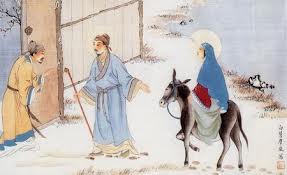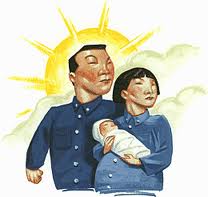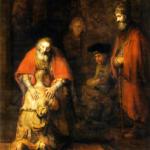There is No Christmas Without Adoption
For years, I heard that of the two NT genealogies of Jesus (in Matthew 1 and Luke 3), one traced his lineage via Joseph and the other through Mary. After all, if Mary is not a blood relative of David, how could the prophecy be true whereby Jesus becomes David’s offspring who would rule the nations (cf. 2 Sam 7; 1 Chron 17)? Adoption, . . . that’s how.
Here are the relevant verses in each genealogy:
Matt 1:16, “. . . and Jacob the father of Joseph the husband of Mary, of whom Jesus was born, who is called Christ” (ESV).
Luke 3:23, “Jesus, when he began his ministry, was about thirty years of age, being the son (as was supposed) of Joseph, the son of Heli, . . . ” (ESV).
Luke is not admitting some vast conspiracy or gross mistake by saying “as was supposed,” He clearly regards Jesus as the “son of David,” who would rule on David’s “throne” as the “Son of the Most High” (1:32; 18:38, 39; cf. 20:41–44). Luke does not simply say that people “supposed” Jesus was David’s descendent, when in fact he wasn’t. No, by accepting Jesus, a supposedly “illegitimate” son (cf. John 8:41?), Joseph adopted Jesus, making him Joseph’s legal son and thus an heir of David.
Why is this significant for the gospel and for the Chinese church?
Without adoption, there would be no gospel. This is because Jesus would not have been an heir of David and thus would not the promised king of Israel who would reign forever. The early apostles consistently link the gospel to the announcement of Jesus’ Davidic kingship. For a few examples, see Acts 13:22-39; Rom 1:1-4; 2 Tim 2:8 (cf. Acts 2:25-36; 15:15-17). We may be accustomed to saying that the gospel leads to our adoption by God the Father. However, the order can be reversed. Because of adoption, there is a gospel.
How does this relate to China? To answer this question, we must first reflect on what Joseph ordeal. He would potentially forfeit much of whatever social standing he had by accepting this girl of gross poor character (as was supposed). Let’s not forget that it was against the Law to have a child before marriage. He not only endures tremulous loss of face, but invests his family name and fortune in a firstborn son who was not actually from his bloodline. The loss of social status and strained friendships would put their future at risk and make it all the more difficult to earn a living.
There are some interesting parallels in contemporary Chinese culture.
First, China infamously has a one-child policy, making it illegal for most people to have more than one child. If a women becomes pregnant, they have been forced to have abortions (as the world saw in summer 2012). Perhaps it’s more typical these days for couples to cave in to social and economic pressures before being forced into an abortion. For example, the father and/or mother may be fired from their job (or else “not have their contract renewed”). A Chinese woman becoming pregnant with her second or third child would be analogous to Mary becoming pregnant with Jesus prior to marriage.
Second, Chinese young men are taught that their filial duty is to perpetuate the family line (captured by the phrase “传宗接代”). The pressure for natural progeny is strong. In fact, nowadays, it is increasingly common for a dating couple to first get the girl pregnant, before marriage, in order to make sure she is able to have kids. If she gets pregnant, they immediately plan a wedding. This is one way people ensure being able to “传宗接代.” (In case you are wondering, it would be unthinkable for a Chinese male to get tested to see if he might be the reason for his wife not getting pregnant).
Joseph would have faced a similar struggle in his culture: If he married Mary, he would have to accept a son who was not biologically his. Of course, many Chinese couples struggle to get pregnant. This is considered shameful and is discussed only in whispers. For typical Chinese couples (including Christians), adoption is never a serious option. When something like adoption does happen, they are not done formally; rather, a kid may be traded/bought in secret and the kid is never told . . . ever.
Third, the average man will not consider marrying a girl if he knows in advance that she is not able to bear children. Most likely, that woman would end up single forever, which is an unimaginable “shame” in Chinese culture. The woman will be a “leftover.” This is the scandal that Mary faced by having Jesus. Her act of faith, according to all common sense, would mean being rejected by prospective husbands.
As an aside––it is illegal in China for couples to give their babies up for adoption. Therefore, abortion or abandonment are the only alternatives to doing the right thing.
How might this Christmas backstory be applied to the Chinese church?
 Whenever I bring up the idea of adopting/fostering orphans to Chinese church leaders, they are immediately resistant or uncomfortable with the idea. I hear a flurry of “It’s illegal. We can’t adopt because we can only have one child!!” Notice the presumption that I am talking about adopting after their first biological child. I then explain that the adoption need not be formal. Babies are found all the time. Families could Orphanages are willing to allow people to foster kids. Furthermore, they could always adopt instead of giving birth.
Whenever I bring up the idea of adopting/fostering orphans to Chinese church leaders, they are immediately resistant or uncomfortable with the idea. I hear a flurry of “It’s illegal. We can’t adopt because we can only have one child!!” Notice the presumption that I am talking about adopting after their first biological child. I then explain that the adoption need not be formal. Babies are found all the time. Families could Orphanages are willing to allow people to foster kids. Furthermore, they could always adopt instead of giving birth.
If that is too radical, the church has numerous couple who cannot conceive kids. They too could adopt. Even if they already have children, they can treat the “adopted” child as their own, essentially becoming parents to the orphan. Every time, I have to remind them: There is no law against loving people.
In order to realize this vision––the Chinese church taking up the cause of orphans––Christians will have to set aside the cultural presumption that one’s children are only those with whom he or she shares DNA. “Blood is thicker than water” is not a biblical idea. It comes from the same “cultural bible” that Americans get the phrase, “God helps those who help themselves.” (I literally heard one of my high school teachers say this “verse” came from the Bible).
Paul fought vehemently against the idolatry of bloodline and ethnicity. The gospel announces that God does not show partiality to any ethnic group (cf. Rom 2:11; Gal 3:28). Paul says, “not all who are descended from Israel belong to Israel, and not all are children of Abraham because they are his offspring, . . . This means that it is not the children of the flesh who are the children of God, but the children of the promise who are counted as offspring,” (Rom 9:6–8). Elsewhere, he says “a Jew is one inwardly, and circumcision is a matter of the heart, by the Spirit, not the letter. His praise is not from man but from God” (Rom 2:29).
Do not mistake me. There definitely are Chinese churches who are taking up the cause of orphan care. I hope to write something in the future about these heroic brothers and sisters. Nevertheless, such practical responses are not yet typical among believers.
What Does This Mean for Theology and Missiological Thinking?
Theologically, notice the root of this problem. Churches neglect the needs of orphans because they have a theological problem. Specifically, they have a gospel problem. Perhaps they know that Jesus died for their sins (individually), but are completely unaware of the gospel’s ethnic and social dimensions, even though they are evident throughout the New Testament. This emphasis is especially clear in Paul’s letters (e.g. Romans, Galatians, Ephesians) and in the Gospels (esp. Matthew, Luke, John). Collectivism, family, and group loyalty are intrinsic to Chinese culture, yet it does not bring the church to think beyond bloodline when it comes to adoption. Their blood family is no most fundamental; rather God’s family consists of those from all ethnic bloodlines.
Might it be possible to so emphasize the individual in salvation that we lose other themes critical to the gospel, such as belonging to God’s restored human family (i.e. collective identity , being adopted as His sons and daughters). One easily overlooks the idolatry of bloodline and ethnic loyalty since it was never introduced in the first place as having critical importance to the gospel.
An individual’s salvation is equivalent to his or her being identification with and incorporated into a new spiritual family.
There is no real tension between individual responsibility and collective identity. The problem comes simply when we so stress the one while remaining silent about the other. Even if we “technically” mention that we “join God’s family,” people hear what we emphasize, regardless of what we mentioned in one or two sentences.
Some things never occur to people. This is human. However, finding solutions to complex problems requires critical thinking skills. Thinking outside the box is not something fostered by Chinese education. Theological training must serve the church by emphasizing how to think––identifying assumptions, analyzing the various sides of a problem, brainstorming, looking outside one’s normal environment, etc. Do our missiological methods come across as easy to do pragmatic solutions? Do we teach a lot of doctrinal facts but not teach exegetical/interpretive skill? Are we equipping people with analytical skills that enable them to think contextually, identify nuance, and adapt to situations?
This is not a West versus East issue. Human beings all need to nurture logical thinking. Try understanding the Bible without using logical words like “because,” “therefore,” “although,” etc. We can’t do it. Just as good clear thinking is essential for interpreting Scripture, so too for solving the practical problems that confront the church.
For those think theology, theological training, and critical thinking are not priorities in the work of missions, I humbly suggest that a nation full of orphans would disagree. God is the God of biological children and adopted children.
Just a Few Resources to Consider
Sites about Adoption and Theological Training
Together for Adoption (ministry website)
Training Leaders International
Theological Famine (website within the Gospel Coalition Blog)
How You Can Help Relieve Theological Famine Around the World (blog post)
Brook Hills Global Blog (Adoption page)
Books and Articles
Reclaiming Adoption: Missional Living through the Rediscovery of Abba Father
Adopted for Life: The Priority of Adoption for Christian Families & Churches
Adopted into God’s Family: Exploring a Pauline Metaphor (New Studies in Biblical Theology)
In Defense of the Theology of Adoption for the Sake of Orphans (article by Dan Cruver)

















